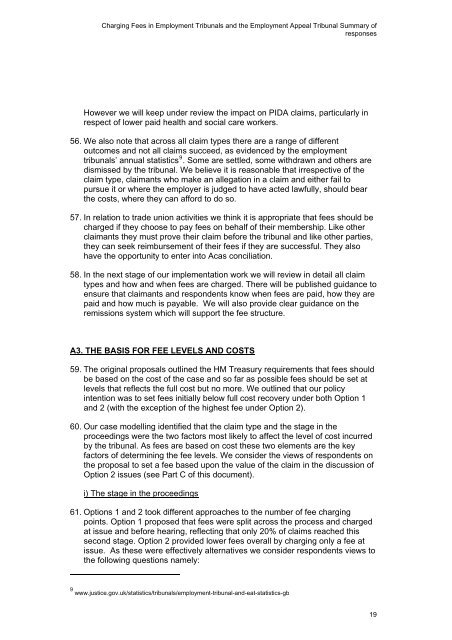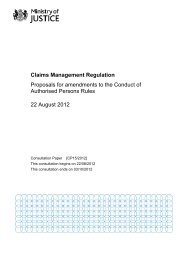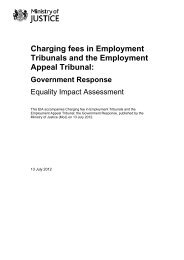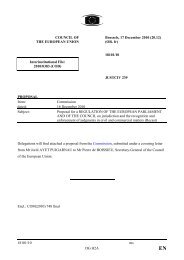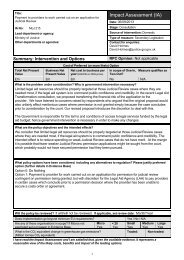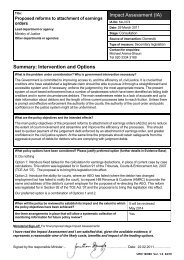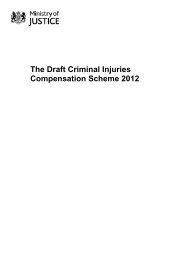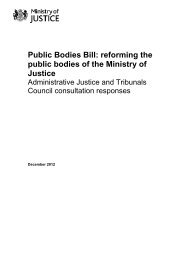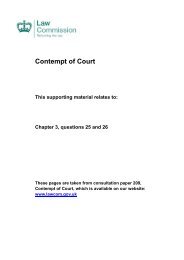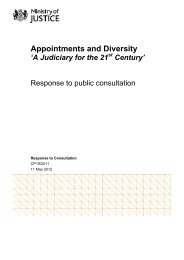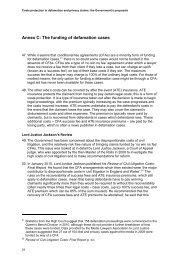Charging Fees in Employment Tribunals and the ... - Ministry of Justice
Charging Fees in Employment Tribunals and the ... - Ministry of Justice
Charging Fees in Employment Tribunals and the ... - Ministry of Justice
Create successful ePaper yourself
Turn your PDF publications into a flip-book with our unique Google optimized e-Paper software.
<strong>Charg<strong>in</strong>g</strong> <strong>Fees</strong> <strong>in</strong> <strong>Employment</strong> <strong>Tribunals</strong> <strong>and</strong> <strong>the</strong> <strong>Employment</strong> Appeal Tribunal Summary <strong>of</strong>responsesHowever we will keep under review <strong>the</strong> impact on PIDA claims, particularly <strong>in</strong>respect <strong>of</strong> lower paid health <strong>and</strong> social care workers.56. We also note that across all claim types <strong>the</strong>re are a range <strong>of</strong> differentoutcomes <strong>and</strong> not all claims succeed, as evidenced by <strong>the</strong> employmenttribunals’ annual statistics 9 . Some are settled, some withdrawn <strong>and</strong> o<strong>the</strong>rs aredismissed by <strong>the</strong> tribunal. We believe it is reasonable that irrespective <strong>of</strong> <strong>the</strong>claim type, claimants who make an allegation <strong>in</strong> a claim <strong>and</strong> ei<strong>the</strong>r fail topursue it or where <strong>the</strong> employer is judged to have acted lawfully, should bear<strong>the</strong> costs, where <strong>the</strong>y can afford to do so.57. In relation to trade union activities we th<strong>in</strong>k it is appropriate that fees should becharged if <strong>the</strong>y choose to pay fees on behalf <strong>of</strong> <strong>the</strong>ir membership. Like o<strong>the</strong>rclaimants <strong>the</strong>y must prove <strong>the</strong>ir claim before <strong>the</strong> tribunal <strong>and</strong> like o<strong>the</strong>r parties,<strong>the</strong>y can seek reimbursement <strong>of</strong> <strong>the</strong>ir fees if <strong>the</strong>y are successful. They alsohave <strong>the</strong> opportunity to enter <strong>in</strong>to Acas conciliation.58. In <strong>the</strong> next stage <strong>of</strong> our implementation work we will review <strong>in</strong> detail all claimtypes <strong>and</strong> how <strong>and</strong> when fees are charged. There will be published guidance toensure that claimants <strong>and</strong> respondents know when fees are paid, how <strong>the</strong>y arepaid <strong>and</strong> how much is payable. We will also provide clear guidance on <strong>the</strong>remissions system which will support <strong>the</strong> fee structure.A3. THE BASIS FOR FEE LEVELS AND COSTS59. The orig<strong>in</strong>al proposals outl<strong>in</strong>ed <strong>the</strong> HM Treasury requirements that fees shouldbe based on <strong>the</strong> cost <strong>of</strong> <strong>the</strong> case <strong>and</strong> so far as possible fees should be set atlevels that reflects <strong>the</strong> full cost but no more. We outl<strong>in</strong>ed that our policy<strong>in</strong>tention was to set fees <strong>in</strong>itially below full cost recovery under both Option 1<strong>and</strong> 2 (with <strong>the</strong> exception <strong>of</strong> <strong>the</strong> highest fee under Option 2).60. Our case modell<strong>in</strong>g identified that <strong>the</strong> claim type <strong>and</strong> <strong>the</strong> stage <strong>in</strong> <strong>the</strong>proceed<strong>in</strong>gs were <strong>the</strong> two factors most likely to affect <strong>the</strong> level <strong>of</strong> cost <strong>in</strong>curredby <strong>the</strong> tribunal. As fees are based on cost <strong>the</strong>se two elements are <strong>the</strong> keyfactors <strong>of</strong> determ<strong>in</strong><strong>in</strong>g <strong>the</strong> fee levels. We consider <strong>the</strong> views <strong>of</strong> respondents on<strong>the</strong> proposal to set a fee based upon <strong>the</strong> value <strong>of</strong> <strong>the</strong> claim <strong>in</strong> <strong>the</strong> discussion <strong>of</strong>Option 2 issues (see Part C <strong>of</strong> this document).i) The stage <strong>in</strong> <strong>the</strong> proceed<strong>in</strong>gs61. Options 1 <strong>and</strong> 2 took different approaches to <strong>the</strong> number <strong>of</strong> fee charg<strong>in</strong>gpo<strong>in</strong>ts. Option 1 proposed that fees were split across <strong>the</strong> process <strong>and</strong> chargedat issue <strong>and</strong> before hear<strong>in</strong>g, reflect<strong>in</strong>g that only 20% <strong>of</strong> claims reached thissecond stage. Option 2 provided lower fees overall by charg<strong>in</strong>g only a fee atissue. As <strong>the</strong>se were effectively alternatives we consider respondents views to<strong>the</strong> follow<strong>in</strong>g questions namely:9 www.justice.gov.uk/statistics/tribunals/employment-tribunal-<strong>and</strong>-eat-statistics-gb19


